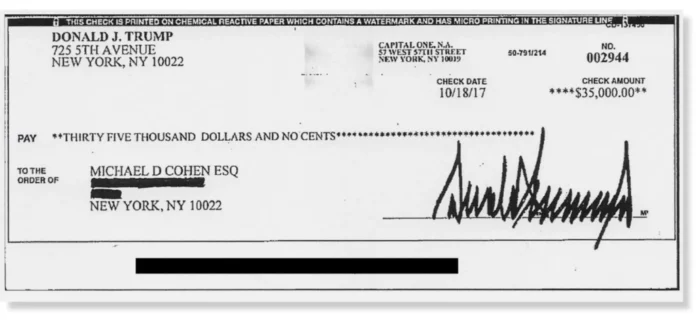There appears to be ample evidence that Donald Trump violated a number of state laws when he told attorney Michael Cohen to pay hush money to a porn star days before the 2016 election, then wrote the expense off as “legal fees”.
We also know that Trump was “Individual-1,” the unindicted co-conspirator in the successful federal criminal prosecution of Cohen for violating campaign finance laws. Ample documentation proved that “Individual-1” directed Cohen to make the illegal payments.
Trump’s protestations of a “witch hunt” and his at times racist attacks on Manhattan District Attorney Alvin Bragg do not constitute a defense, and are immaterial to the central issue of Trump’s criminality.
So what is his defense? Trump’s attorneys don’t contest that he had Cohen pay off the porn star, Stormy Daniels, to keep her quiet. They don’t contest that Trump reimbursed Cohen by paying him for “legal services.”
His actual “defense” appears to be primarily that he would have paid off Daniels regardless of his political campaign, simply to avoid embarrassment, so it was all just a personal matter.
That’s a laughable defense.
So those are the facts of the case: the evidence of a crime and the defense.
But the facts of the case have not been the focus of the coverage by the elite corporate media. Its coverage is seemingly about everything else, most monotonously an endless litany of articles about imagined legal hurdles and the “political firestorm” surrounding the case.
It’s certainly true that Trump could get off due to a legal technicality. But the coverage of that one factor is disproportionate and only feeds into the false but dominant media narrative that this is a tough decision for the prosecutor that should be made with a view toward the political implications.
That is a toxic view that makes a mockery of the rule of law.
As Protect Democracy’s Aaron Baird recently wrote to me in an email, the media “can help the legal system work as intended by carefully evaluating the strength of the pending cases, as well as clearly explaining any claims made by the prosecution or the former president.”
Questions reporters should be asking – and answering – include:
- Based on the evidence, is there probable cause to believe a crime was committed?
- Based on the standard criteria for the exercise of prosecutorial discretion, would anyone else be indicted on similar facts?
- Is Trump defending himself against the charges by using the legal process, or is he attacking the process itself or asking supporters to attack and intimidate participants in the process?
I worry that even when a detailed, fact-filled indictment is handed up, the media coverage will continue to be mostly about the political fireworks. The public deserves better.
Of course the case has political implications. If the indictment is as incriminating as I expect it to be, then the media should be full of stories about how extreme, unhealthy, and dangerous it is for Trump to be a serious candidate for president.
Those dangers have been clear for years, never more so than in the wake of the attack on the Capitol that Trump incited, but an indictment should once again force the question: Why aren’t factors that would normally be considered disqualifying for someone to run for dogcatcher somehow irrelevant to Republican leaders and voters?
The coverage should certainly recognize the unprecedented nature of the indictment, but not as some sort of statement about our divided politics. The focus should be on accountability, on the rule of law, and on the insanity that this man remains a viable presidential candidate.

It’s certainly infuriating that the bulk of mainstream media coverage of the prosecutors and grand juries investigating Trump treats the issue as a political rather than a legal issue. It’s also frustrating, if less so, when the media publish endless stories speculating that indictments are just around the corner on the basis of little or no evidence. I’ve seen cable news shows spend entire hours on talking heads guessing what this or that prosecutor may be about to do. Is it too much to ask commentators to deep-six the “here come the indictments” stories and concentrate on actual news?
William Paley shifts in his coffin
When 60 minutes decided to monetize NEWS and suddenly made NEWS divisions subject to budgets that was the beginning of the End of Journalism.
It should be treated as Paley intended l: a public service announcement, but it’s too late now
I appreciate the fortitude of Froomkin et al, but putting that genie back in the bottle is not gonna happen..ever